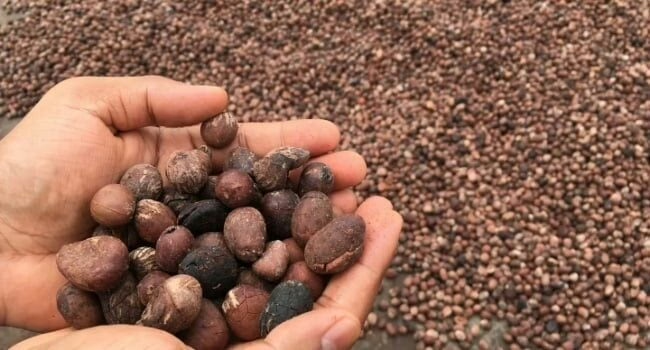Recent market trends indicate that shea nut prices in Nigeria are regaining stability following a temporary decline triggered by the Federal Government’s prohibition on raw exports. Initially, prices dropped sharply right after the ban was announced, but they have since recovered steadily as domestic processors have increased their intake of local supply. Currently, prices are nearing the levels seen before the ban, reflecting a strengthening trust in the government’s strategy.
Prior to the ban, shea nuts were trading at an average of ₦850 per kilogram. Immediately after the export restriction was implemented, prices plunged to roughly ₦570 per kilogram as traders and intermediaries adapted to the new market conditions. By mid-September, prices had climbed back to ₦710, and by the end of the month, they reached around ₦800 per kilogram, signaling renewed market confidence and a better equilibrium between supply and demand. Today, the average price hovers near ₦1,000 per kilogram, demonstrating both recovery and enhanced market stability.
This initiative is part of the Renewed Hope Agenda and aligns with President Bola Ahmed Tinubu’s Nigeria First Economic Policy, which emphasizes boosting domestic value addition as a key driver of economic growth.
Although Nigeria produces over one-third of the world’s shea nuts, it captures less than 1% of the global market valued at US$6.5 billion, largely because raw nuts have traditionally been exported with minimal processing. By securing raw materials for more than 20 local processing plants-many of which were operating at less than 30% capacity-the export ban is revitalizing the industry, protecting jobs, and enhancing economic resilience.
“This policy provides the stability we’ve long awaited to plan, invest, and scale up operations,” stated Sadiq Kassim, Public Relations Officer of the Nigeria Agribusiness Group (NABG).
“Previously, the unregulated export of raw shea nuts caused volatile price fluctuations and marginalized local processors. With the ban, raw materials remain within the country, prices are stabilizing, and factories can operate closer to full capacity. This translates to improved earnings for rural women, consistent demand for farmers, and a more robust foundation for Nigeria’s shea industry.”
This approach complements the 30% Value Addition Bill, championed by the Raw Materials Research & Development Council (RMRDC) and passed by the Senate in July 2025. The bill, now pending approval by the House of Representatives and Presidential assent, requires that no Nigerian raw material be exported without undergoing at least 30% processing domestically.
Professor Nnanyelugo Martin Ike-Muonso, Director-General of RMRDC, emphasized, “Without incentives to enhance capacity throughout our value chains, inefficiencies persist, prices escalate, and opportunities slip away. That is why we are advocating for the 30% value addition bill-to safeguard local industries, generate employment, and prioritize Nigeria’s economic interests.”
Olaolu Ajide, a Local Buying Agent based in Ibadan, praised the government’s export ban on raw shea nuts, noting, “Halting raw shea nut exports positively impacts the economy. It is crucial that the government enforces this ban to enable local industries to flourish and expand the value chain, thereby creating more jobs for our citizens.”
The Federal Ministry of Industry, Trade & Investment is actively engaging with processors, traders, and farmer cooperatives to ensure the policy’s effective implementation. Supporting this effort, the Presidential Food Systems Coordinating Unit (PFSCU) will conduct a rapid assessment next month across the five principal shea-producing states, involving processors and traders. This evaluation aims to update data, identify challenges, and maintain alignment between government and industry in advancing Nigeria’s industrialization goals under the Renewed Hope Agenda and the Nigeria First Economic Policy.






















